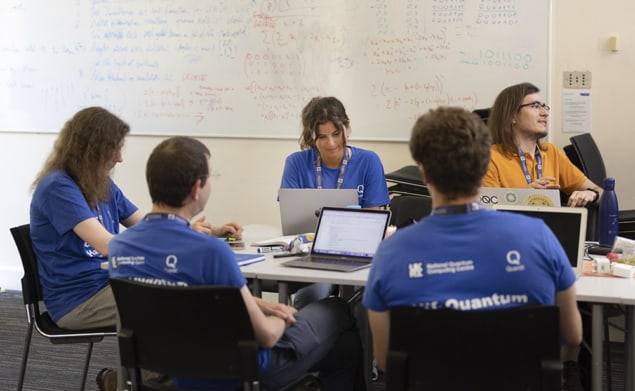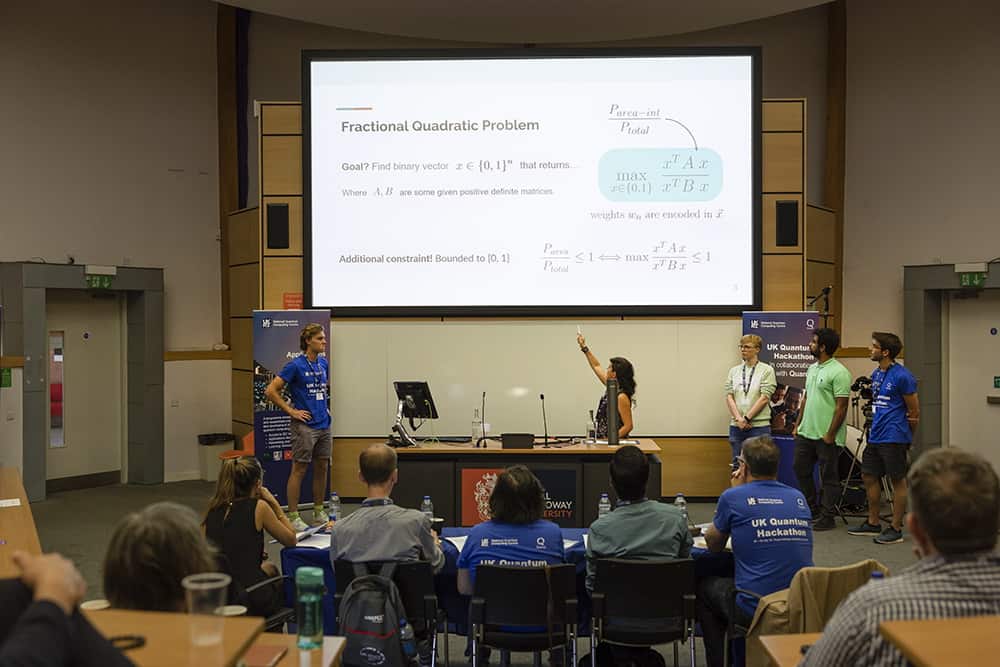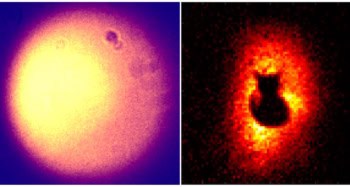The UK’s first quantum computing hackathon challenged teams of students and early-career scientists to devise novel quantum solutions to real-life problems

Nine teams of research students and early-career scientists lined up at the end of July to compete in the UK’s first quantum computing hackathon. Organized by the National Quantum Computing Centre (NQCC) in collaboration with QuantX, the event challenged the teams to devise novel quantum solutions to problems set by end users such as BT, the NHS and Rolls Royce.
By the end of the two-day event, several teams had run their algorithms on quantum hardware provided by technology partners IBM, Oxford Quantum Circuits and AWS. Others, who had developed solutions beyond the capabilities of current quantum processors, tested their solutions on quantum simulators, with programming experts from each of the technology providers on hand to provide support and advice. “We’ve been checking in with the teams throughout the event, and helping with some of the more technical code,” said IBM’s Frank Harkins. “Some have a good vision of where to go and how to use the code, while for some of the others we’ve helped with a bit of the theory and the algorithms.”
Mentors from each of the end-user organizations also worked alongside the teams to offer expert domain knowledge, explain the context for the problem, and guide the hackers towards potential solutions. The challenge set by Rolls Royce, for example, was to predict the lifetime of a jet engine based on data recorded during operation. “First of all I framed the use case, and from there I guided them through quantum machine learning as a possible approach,” commented mentor Jarrett Smalley, one of the company’s specialists in quantum computing. “They came up with a novel approach that blends some existing ideas together in a new way, and it’s been really cool to watch it develop from nothing to a working model in just two days.”
Another problem, set by the NHS, challenged the hackers to devise a strategy for allocating patients to beds while also taking account of various constraints. “It’s an extremely complex problem that is usually worked out by people on the ground with a lot of domain knowledge,” explained mentor Dan Schofield, a senior data scientist within the NHS Transformation Directorate. “We are probably a few steps off having any quantum computing in the NHS, but it has been really interesting to find out how quantum approaches might be able to solve the sort of problems we’re looking at.”
The hackathon was the first hands-on event organized by the NQCC to bring together quantum developers, end users and technology providers to work on real-world problems. In May 2022 it launched its SparQ applications discovery programme, which aims to provide end users with an opportunity to experiment with quantum algorithms and hardware for tackling relevant use cases within their sector. “It’s all about growing the user community for quantum computing,” said NQCC director Michael Cuthbert. “There’s nothing like running a piece of code yourself, and running it on a real quantum computer, to engage with the technology and understand its capabilities.”
Cuthbert has been encouraged by the level of interest and commitment in the hackathon. “We were oversubscribed for places, and we’ve had terrific support from our industry partners and the quantum technology providers,” he said. “The teams of hackers have been incredibly engaged and enthusiastic – some were working on their solution well into the night – and they have worked together extremely effectively to come up with some impressive solutions in a short amount of time.”
For the students and researchers who made up the teams, the hackathon offered a valuable insight into the advantage that near-term quantum algorithms might offer for industrial applications. Maria Violaris, a PhD student from the University of Oxford, was working on a pursuit-and-evasion problem set by defence company MBDA. Her team was trying to train a quantum neural network to come up with the best strategy for a chaser (the “monster”) to reach the target (the “princess”) in the fastest possible time – a problem that is relevant not just to the defence sector, but also to other applications such traffic control or security systems in museums and art galleries.
“It has been really good to have two days where you are fully focused on one project, and to take a use case and connect it back to the quantum algorithms that could be used to solve the problem,” Violaris commented. “We’ve made a lot of headway given the short timescale, and we generated some promising results when we tested the algorithm both on a quantum simulator and on a real quantum processor. It has been a great way to accelerate learning.”
Such rapid progress was in part made possible by a structured approach to team selection. The NQCC’s Chiara Decaroli, who was responsible for organizing the event, explains that prospective hackers were asked to specify their skill level as well as their prior experience with quantum programming as part of the application process. “We created teams with people from different disciplines and with a range of skill sets, including relative beginners in the quantum field who knew how to build algorithms or models,” she explained. “The teams were quick to identify which of them had the expertise to perform each specific task, and that had a huge impact on the results they produced in a very short time.”
Master’s student Eden Schirman from Imperial College London certainly felt the benefit of that approach. He was assigned to a team working with THALES to develop a quantum algorithm for detecting anomalies in sonar data recorded by submarines, which could be generated by enemy submarines or missiles with an unknown signature. “At the beginning I asked to be put in a team with other people from Imperial, but it was a smart decision to mix up the teams,” he said. “It has been good to collaborate with new people, to listen to new ideas, and to work on a quantum algorithm that is related to my research but not the same. It has opened my mind to new directions for developing quantum algorithms.”
Schirman also valued the input from THALES and the technical experts from IBM. “Our industry mentor told us about the use case and the data, as well as the classical implementations and algorithms that are typically used, while two specialists from IBM helped us throughout the event with the implementation and with new ideas for quantum algorithms. It’s been really helpful to have access to that knowledge and to get a different point of view.”

At the end of the hackathon – just 30 hours after it started the previous day – the teams presented their solutions to all the other participants, as well as to a judging panel that included Cuthbert, Decaroli, and quantum experts from both industry and academia. “All the presentations were amazing,” said Decaroli. “The criteria for us judges were to look at the creativity of the solution, whether the team had investigated the scalability of their approach to more powerful quantum machines, and how well they presented their results and answered any questions.”
The winning team, who named themselves Quassian, had been working with MDBA on a quantum machine learning approach to speed up complex simulations in aerospace engineering. The Rolls Royce group mentored by Smalley came second, while third went to a BT-sponsored team testing different quantum and classical methods for optimizing the performance of 2D antenna arrays. “All of the presentations demonstrated huge amounts of work, commitment and enthusiasm over the last couple of days,” commented Cuthbert, before presenting the prizes to the winning teams. “You have made friends and contacts that will stay with you for the rest of your career, and I hope it is just the start of your engagement with quantum computing and the NQCC.”
The success of the event paves the way for future hackathons, most likely focused on specific industry sectors to encourage more early-career professionals to take part. It also provides the NQCC team with a useful springboard for its ongoing engagement with the UK’s growing quantum ecosystem. “The hackathon encapsulates all the key elements of SparQ, but on a smaller scale,” said Decaroli. “We can extend this hackathon template to longer term projects where quantum developers, end users and technology providers can work together to develop more complex solutions and test them on multiple hardware platforms.”




